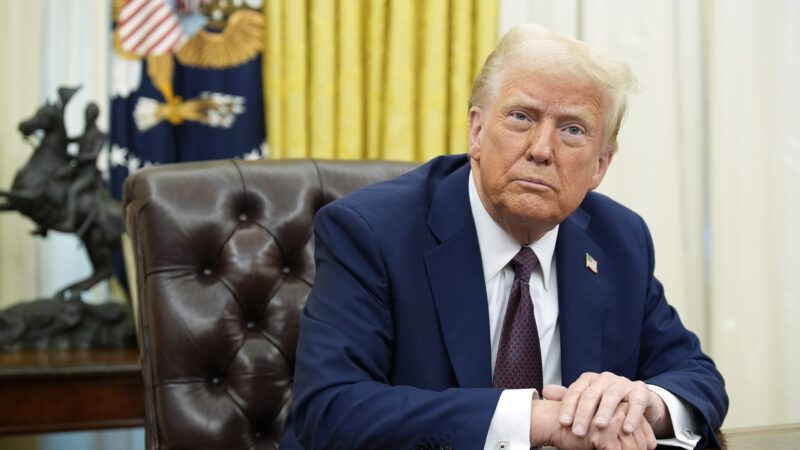The Problem With Trump's Birthright Citizenship Order
Former Rep. Justin Amash explains why President Donald Trump's interpretation of the Fourteenth Amendment is wrong.

There's a problem with President Donald Trump's birthright citizenship executive order, and it doesn't take much effort to see it.
The Fourteenth Amendment reads, in relevant part: "All persons born or naturalized in the United States, and subject to the jurisdiction thereof, are citizens of the United States and of the State wherein they reside."
Trump's odd claim is that a child born in the United States without at least one parent who is a lawful permanent resident or U.S. citizen is not "subject to the jurisdiction" of the United States.
But this is simply false.
Set aside that Trump's executive order would affect children whose parents are lawfully but not permanently here, such as those on student or work visas. Let's look at the "harder" case: the children of illegal immigrants.
It should be obvious that even individuals who are unlawfully present in the United States are "subject to the jurisdiction thereof." "Jurisdiction" is just the applicability of legal authority to them and the potential exercise of state power against them.
People who are unlawfully present in the country can, of course, be charged with crimes, arrested, and subjected to the same legal processes as almost anyone else in the United States. There is not a person who doubts this, least of all someone in the Trump administration.
I include the word "almost" before "anyone else" in the paragraph above because the phrase "subject to the jurisdiction thereof" does exclude certain children: mainly the children of foreign diplomats, who, in fact, are generally not subject to U.S. laws. They have immunity that may or may not be waived by their home country.
Some have suggested that one of the authors of the Fourteenth Amendment, Sen. Jacob Howard (R–Mich.), stated in a floor speech that he intended for the provision to exclude anyone born to foreigners, but a careful reading of the congressional transcript shows otherwise.
Howard said: "This will not, of course, include persons born in the United States who are foreigners, aliens, who belong to the families of ambassadors or foreign ministers accredited to the government of the United States, but will include every other class of person."
The construction of this sentence reveals that he is describing just one class of persons. Each word or phrase is clarifying the one before it: "foreigners, aliens, who belong to the families of ambassadors or foreign ministers." There is no "and." He is just describing foreign diplomats.
This is indicated not just by grammar but by logic. If Howard were indeed describing three groups, then his statement would be wildly redundant and tedious. These groups would not be distinct in any meaningful way. Why even bother mentioning foreign diplomats, a peculiarly specific class, if you've already said the provision excludes the children of all foreigners?
Others have suggested that because foreigners are subject to the jurisdiction of a foreign government they cannot be subject to the jurisdiction of the United States. Besides being plainly untrue—an American traveling overseas, for example, is subject both to the jurisdiction of the United States and the country in which they are traveling—the proponents of this position again run into a construction problem.
If the authors of the provision had intended to require "exclusive" jurisdiction, then it would not have been difficult for them to write "and subject to the exclusive jurisdiction thereof." They did not because that's not what they meant.
Now, you may not like the fact that the Constitution broadly grants birthright citizenship to the children of parents who are simply, perhaps even temporarily, present in the United States, but that is the law absent a constitutional amendment.
We are a nation founded on the rule of law. The president cannot amend the Constitution (or laws) via executive order. Any unilateral effort by a president to change the Constitution is void. Only an Article V amendment can change it.


Show Comments (132)